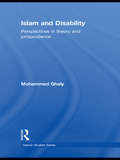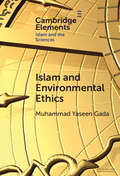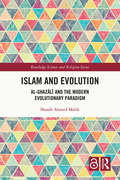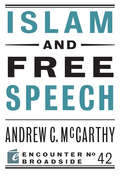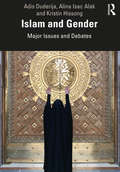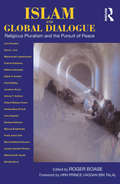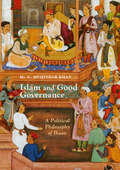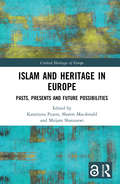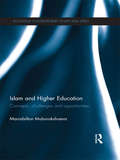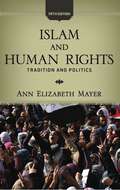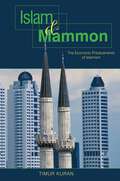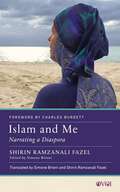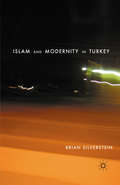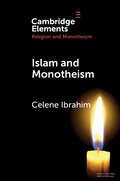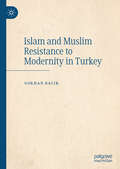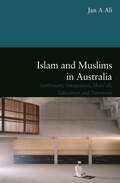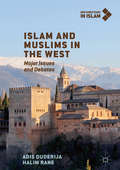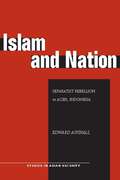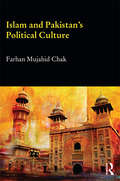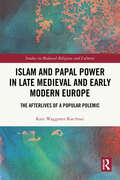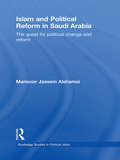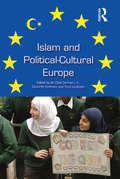- Table View
- List View
Islam and Disability: Perspectives in Theology and Jurisprudence (Routledge Islamic Studies Series)
by Mohammed GhalyThis book explores the position of Islamic theology and jurisprudence towards people with disabilities. It investigates how early and modern Muslim scholars tried to reconcile their existence with the concept of a merciful God, and also looks at how people with disabilities might live a dignified and productive life within an Islamic context. In his analysis of Islamic Theology, Ghaly pays attention to how theologians, philosophers and Sufis reflected on the purposes behind the existence of this phenomenon, and how to reconcile the existence of disability with specific divine attributes and an All-Merciful God. Simultaneously exploring the perspective of Muslim jurists, the book focuses on how people with disabilities can lead a dignified life in the financial and non-financial sense, in an extensive analysis of topics such as the human dignity of people with disabilities and the role of Greek physiognomy, their employability, medical treatment, social life with main focus on marriage-related issues, financial life and means of living. Investigating the topic of disability from early and modern Islamic perspectives, the author provides an analysis of Muslim discussions on various bioethical questions. As such, this book will be of great relevance to current heated debates on human rights of people with disabilities, as well as providing a valuable resource for courses on Multicultural bioethics, Islamic theology, Islamic law and medical anthropology.
Islam and English Law
by Robin Griffith-JonesFormer Archbishop of Canterbury Rowan Williams triggered a storm of protest when he suggested that some accommodation between British law and Islam's shari'a law was 'inevitable'. His foundational lecture introduced a series of public discussions on Islam and English Law at the Royal Courts of Justice and the Temple Church in London. This volume combines developed versions of these discussions with new contributions. Theologians, lawyers and sociologists look back on developments since the Archbishop spoke and forwards along trajectories opened by the historic lecture. The contributors provide and advocate a forward-looking dialogue, asking how the rights of all citizens are honoured and their responsibilities met. Twenty specialists explore the evolution of English law, the implications of Islam, shari'a and jihad and the principles of the European Convention on Human Rights, family law and freedom of speech. This book is for anyone interested in the interaction between religion and secular society.
Islam and Environmental Ethics (Elements in Islam and Science)
by Muhammad Yaseen GadaThis Element explores environmental ethics in Islam. Its core argument is that Islamic culture and civilization are rich in environmental concerns; Islam has unique considerations and directions about what sort of human-nature relationship there should be. Muslim environmental commentators have explored basic environmental or eco-ethical principles that are deeply embedded in the Qur'an and Sunnah. Protecting and conserving the environment are not only moral duties but also an obligation in Islam. The Islamic environmental ethical system offers both conceptual paradigms and operational components to realize environmental justice and sustainable development.
Islam and Evolution: Al-Ghazālī and the Modern Evolutionary Paradigm (Routledge Science and Religion Series)
by Shoaib Ahmed MalikThis book attempts to equip the reader with a holistic and accessible account of Islam and evolution. It guides the reader through the different variables that have played a part in the ongoing dialogue between Muslim creationists and evolutionists. This work views the discussion through the lens of al-Ghazālī (1058-1111), a widely-known and well-respected Islamic intellectual from the medieval period. By understanding al-Ghazālī as an Ash’arite theologian, a particular strand of Sunni theology, his metaphysical and hermeneutic ideas are taken to explore if and how much Neo-Darwinian evolution can be accepted. It is shown that his ideas can be used to reach an alignment between Islam and Neo-Darwinian evolution. This book offers a detailed examination that seeks to offer clarity if not agreement in the midst of an intense intellectual conflict and polarity amongst Muslims. As such, it will be of great interest to scholars of Science and Religion, Theology, Philosophy of Religion, Islamic Studies, and Religious Studies more generally.
Islam and Free Speech
by Andrew C MccarthyIn January 2015, Muslim terrorists massacred cartoonists and writers at the Paris offices of the satirical magazine Charlie Hebdo, proclaiming to be avenging Islam's prophet. The rampage, which included the murders of hostages at a kosher market, prompted global leaders and throngs of citizens to rally in support of free expression. But was the support genuine?In this Broadside, Andrew C. McCarthy explains how leading Islamists have sought to supplant free expression with the blasphemy standards of Islamic law, gaining the support of the U.S. and other Western governments. But free speech is the lifeblood of a functioning democratic society, essential to our capacity to understand, protect ourselves from, and ultimately defeat our enemies.
Islam and Gender: Major Issues and Debates
by Adis Duderija Alina Alak Kristin HissongGiven the intense political scrutiny of Islam and Muslims, which often centres on gendered concerns, Islam and Gender: Major Issues and Debates is an accessible and comprehensive introduction to the key topics, problems and debates in this engaging subject. Split into three parts, this book places the discussion in its historical context, provides up-to-date case studies and delves into contemporary debate on the subject. This book includes discussion of the following important topics: Marriage and divorce Interpretations of the Qur’an and Sunna Male and female sexuality and sexual diversity Classical Islamic thought on masculinity and femininity Gender and hadith Polygamy and inheritance Adultery and sexual violence Veiling, female circumcision and crimes of honour Lived religiosities Gender justice in Islam. Islam and Gender is essential reading for students in religious studies, Islamic studies and gender studies, as well as those in related fields, such as cultural studies, politics, area studies, sociology, anthropology and history.
Islam and Global Dialogue: Religious Pluralism and the Pursuit of Peace
by Roger Boase Hrh Prince Hassan Bin TalalAt a time when the world is becoming increasingly interdependent, multi-cultural and multi-religious, the concept of religious pluralism is under assault as a result of hatred, prejudice and misunderstanding from both religious exclusivists and dogmatic secularists. In this important and timely book, twenty internationally acclaimed scholars and leading religious thinkers respond to contemporary challenges in different ways. Some discuss the idea of a dialogue of civilisations; others explore the interfaith principles and ethical resources of their own spiritual traditions. All of them reject the notion that any single religion can claim a monopoly of wisdom; all are committed to the ideal of a just and peaceful society in which people of different religions and cultures can happily coexist. More space is here given to Islam than to Judaism and Christianity because, as a result of negative stereotypes, it is the most misunderstood of the major world religions. HRH Prince Hassan bin Talal of Jordan contributes the Foreword.
Islam and Good Governance: A Political Philosophy of Ihsan
by M. A. KhanThis book advances an Islamic political philosophy based on the concept of Ihsan, which means to do beautiful things. The author moves beyond the dominant model of Islamic governance advanced by modern day Islamists. The political philosophy of Ihsan privileges process over structure, deeds over identity, love over law and mercy and forgiveness over retribution. The work invites Muslims to move away from thinking about the form of Islamic government and to strive to create a self-critical society that defends national virtue and generates institutions and practices that provide good governance.
Islam and Heritage in Europe: Pasts, Presents and Future Possibilities (Critical Heritages of Europe)
by Sharon Macdonald Katarzyna Puzon Mirjam ShatanawiIslam and Heritage in Europe provides a critical investigation of the role of Islam in Europe’s heritage. Focusing on Islam, heritage and Europe, it seeks to productively trouble all of these terms and throw new light on the relationships between them in various urban, national and transnational contexts. Bringing together international scholars from a range of disciplines, this collection examines heritage-making and Islam in the context of current events in Europe, as well as analysing past developments and future possibilities. Presenting work based on ethnographic, historical and archival research, chapters are concerned with questions of diversity, mobility, decolonisation, translocality, restitution and belonging. By looking at diverse trajectories of people and things, this volume encompasses multiple perspectives on the relationship between Islam and heritage in Europe, including the ways in which it has played out and transformed against the backdrop of the ‘refugee crisis’ and other recent developments, such as debates on decolonising museums or the resurgence of nationalist sentiments. Islam and Heritage in Europe discusses specific articulations of belonging and non-belonging, and the ways in which they create new avenues for re-thinking Islam and heritage in Europe. This ensures that the book will be of interest to academics, researchers and postgraduate students engaged in the study of heritage, museums, Islam, Europe, anthropology, archaeology and art history.
Islam and Higher Education: Concepts, Challenges and Opportunities (Routledge Contemporary South Asia Series)
by Marodsilton MuborakshoevaThis book is the first study to qualitatively explore the concepts of higher education in Muslim contexts. It examines the different concepts of ‘a university’ and the way they shape practice in Muslim contexts, with a particular focus on the Islamic republic of Pakistan. Contributing to theoretical debates and discussing practical challenges that universities in Muslim countries face, the author analyses seven higher education institutions in Pakistan. She argues that there is a need for institutions to constantly review their mission and aims and objectives in light of the wider economic, political, and socio-cultural and religious development of a society. The book reviews the history of higher education institutions and examines opportunities for some Pakistani universities, to become centres of excellence in the future. This is subject to adequate support from the government, industries, philanthropists and the society at large. In return, these universities would have to cater to the needs of the society, from basic needs in the areas of health and education to science and technology. Islam and Higher Education breaks new grounds in the field of higher education in Muslim contexts and will be of interest to researchers in the fields of comparative education and Islamic Studies.
Islam and Human Rights
by Ann Elizabeth MayerIslam and Human Rightsis a probing examination of how the Islamic tradition has been exploited for political ends by regimes and institutions seeking to legitimize policies inimical to human rights. Ann Elizabeth Mayer critically appraises Islamic human rights schemes that dilute the human rights afforded by international law, comparing them with the complex Islamic legal heritage and international human rights law. Challenging stereotypes about a supposedly monolithic Islam inherently incompatible with human rights, Mayer dissects the political motives behind the selective deployment of elements of the Islamic tradition by conservative forces seeking to delegitimize demands for democracy and human rights. The fifth edition provides an updated consideration of government policies on Islam and human rights activism and how they are affecting developments in several Middle Eastern countries, and features a new chapter on the resistance of human rights for sexual minoritiesby the Organization of Islamic Cooperation (OIC) and Muslim states. The new edition also analyzes the other most recent and important issues of the region, including: The burgeoning pressures in the Middle East for human rights leading up to the Arab Spring; The ambitious campaign of the (OIC) to influence the UN human rights system by forging alliances with non-Muslim states hostile to human rights; The concerted efforts by this cross-cultural alliance to subvert international human rights law under pretenses of supporting human rights; The intensifying controversies over issues of sexual orientation and gender identity in the Middle East; The Danish Cartoons controversy and the OIC project to co-opt international human rights law to criminalize “defamation of Islam” occurring in the West.
Islam and Human Rights
by Ann Elizabeth MayerIslam and Human Rights is a probing examination of how the Islamic tradition has been exploited for political ends by regimes and institutions seeking to legitimize policies inimical to human rights. Ann Elizabeth Mayer critically appraises Islamic human rights schemes that dilute the human rights afforded by international law, comparing them with the complex Islamic legal heritage and international human rights law. Challenging stereotypes about a supposedly monolithic Islam inherently incompatible with human rights, Mayer dissects the political motives behind the selective deployment of elements of the Islamic tradition by conservative forces seeking to delegitimize demands for democracy and human rights. The fifth edition provides an updated consideration of government policies on Islam and human rights activism and how they are affecting developments in several Middle Eastern countries, and features a new chapter on the resistance of human rights for sexual minoritiesby the Organization of Islamic Cooperation (OIC) and Muslim states. The new edition also analyzes the other most recent and important issues of the region, including: The burgeoning pressures in the Middle East for human rights leading up to the Arab Spring; The ambitious campaign of the (OIC) to influence the UN human rights system by forging alliances with non-Muslim states hostile to human rights; The concerted efforts by this cross-cultural alliance to subvert international human rights law under pretenses of supporting human rights; The intensifying controversies over issues of sexual orientation and gender identity in the Middle East; The Danish Cartoons controversy and the OIC project to co-opt international human rights law to criminalize "defamation of Islam" occurring in the West.
Islam and Human Rights
by Ann Elizabeth MayerIslam and Human Rights is a probing examination of how the Islamic tradition has been exploited for political ends by regimes and institutions seeking to legitimize policies inimical to human rights. Ann Elizabeth Mayer critically appraises Islamic human rights schemes that dilute the human rights afforded by international law, comparing them with the complex Islamic legal heritage and international human rights law. Challenging stereotypes about a supposedly monolithic Islam inherently incompatible with human rights, Mayer dissects the political motives behind the selective deployment of elements of the Islamic tradition by conservative forces seeking to delegitimize demands for democracy and human rights. The fifth edition provides an updated consideration of government policies on Islam and human rights activism and how they are affecting developments in several Middle Eastern countries, and features a new chapter on the resistance of human rights for sexual minorities by the Organization of Islamic Cooperation (OIC) project to co-opt international human rights law to criminalize "defamation of Islam” occurring in the West. The new edition also analyzes the other most recent and important issues of the region, including: The burgeoning pressures in the Middle East for human rights leading up to the Arab Spring; The ambitious campaign of the (OIC) to influence the UN human rights system by forging alliances with non-Muslim states hostile to human rights; The concerted efforts by this cross-cultural alliance to subvert international human rights law under pretenses of supporting human rights; The intensifying controversies over issues of sexual orientation and gender identity in the Middle East; The Danish Cartoons controversy and the OIC project to co-opt international human rights law to criminalize "defamation of Islam” occurring in the West.
Islam and Mammon: The Economic Predicaments of Islamism
by Timur KuranThe doctrine of "Islamic economics" entered debates over the social role of Islam in the mid-twentieth century. Since then it has pursued the goal of restructuring economies according to perceived Islamic teachings. Beyond its most visible practical achievement--the establishment of Islamic banks meant to avoid interest--it has promoted Islamic norms of economic behavior and founded redistribution systems modeled after early Islamic fiscal practices. In this bold and timely critique, Timur Kuran argues that the doctrine of Islamic economics is simplistic, incoherent, and largely irrelevant to present economic challenges. Observing that few Muslims take it seriously, he also finds that its practical applications have had no discernible effects on efficiency, growth, or poverty reduction. Why, then, has Islamic economics enjoyed any appeal at all? Kuran's answer is that the real purpose of Islamic economics has not been economic improvement but cultivation of a distinct Islamic identity to resist cultural globalization. The Islamic subeconomies that have sprung up across the Islamic world are commonly viewed as manifestations of Islamic economics. In reality, Kuran demonstrates, they emerged to meet the economic aspirations of socially marginalized groups. The Islamic enterprises that form these subeconomies provide advancement opportunities to the disadvantaged. By enhancing interpersonal trust, they also facilitate intragroup transactions. These findings raise the question of whether there exist links between Islam and economic performance. Exploring these links in relation to the long-unsettled question of why the Islamic world became underdeveloped, Kuran identifies several pertinent social mechanisms, some beneficial to economic development, others harmful.
Islam and Me: Narrating a Diaspora (Other Voices of Italy)
by Shirin Ramzanali FazelGrowing up in Mogadishu, Somalia, Shirin Ramzanali Fazel was immersed in the language and culture of Italy, Somalia’s former colonizer. Yet when she moved to Italy as a young mother in the 1970s, she discovered a country where immigrants and Muslims were viewed with a mixture of curiosity and suspicion–where, even today, she and her children must seemingly prove they are Italian. In Islam and Me, Fazel tells her story and shares the experiences of other Muslim women living in Italy, revealing the wide variety of Muslim identities and the common prejudices they encounter. Looking at Italian school textbooks, newspapers, and TV programs, she invites us to change the way Muslim immigrants, and especially women, are depicted in both news reports and scholarly research. Islam and Me is a meditation on our multireligious, multiethnic, and multilingual reality, as well as an exploration of how we might reimagine national culture and identity so that they become more diverse, inclusive, and anti-racist.
Islam and Modernity in Turkey
by Brian SilversteinThis book combines fine-grained ethnography with conceptual and analytical work to examine Islamic discourses and practices and their articulation within mass media.
Islam and Monotheism (Elements in Religion and Monotheism)
by Celene IbrahimMonotheism (tawḥīd)-as attested to by the cosmos, known through reason, explicated in revelation, and exemplified by the lives of the righteous-forms the core of the Islamic worldview. A conviction in this unadulterated monotheism unifies Muslims across time and place; it is found in the core profession of faith (the shahāda) and is reinforced by thousands of Qur'anic verses and prophetic teachings. Drawing on the Qur'anic discourse, sayings of the Prophet Muḥammad, and select theological works, this Element provides a concise and accessible introduction to the most fundamental concept in Islamic thought. The work explains the nature and attributes of God and examines how tawḥīd informs conceptions of truth, morality, piety, and virtue.
Islam and Muslim Resistance to Modernity in Turkey
by Gokhan BacikThis book explores how traditional Sunni Muslim conceptions have informed or shaped Islamization strategies in contemporary Turkey. In particular, the author proposes to examine the teaching curriculum of the Ministry of Education, which oversees Turkish public religious education; the activities and teachings of Diyanet, the constitutional organ responsible for managing all religious affairs; and the ideas and activities of three Muslim religious groups currently operating in Turkey. The monograph explains how the interpretation and practice of Islam affects various situations in the Muslim world and analyzes the concept of nature in Islam, which has been an indivisible component of Islamic tradition since the beginning.
Islam and Muslims in Australia: Settlement, Integration, Shariah, Education and Terrorism
by Jan A AliIslam has long been a part of the multicultural landscape of major urban centres in Australia and encompasses a great diversity of theological, jurisprudential and cultural practices. Despite this, in popular discourse, media presentations, and political debates Muslims are represented as a homogeneous group. This timely book examines the growing presence of Islam and Muslims in Australia and how it is transforming, and transformed by, social, cultural and religious spaces. Employing critical analysis and macrosociology, Islam and Muslims in Australia provides valuable insights into this growth and development and illuminates how socio-cultural, economic, and political processes maintain and manage the ways Australian Muslims build their religious lives and identities and engage in the wider world, while facing the inevitable effects of modernity. This book argues that Islam in different parts of the world as well as in Australia is more than just a religion, a cultural system or a social structure, but is a complex composite of diverse institutional processes and functions, social routines and norms, and sacred rituals and practices responsible for shaping the lives of Muslims. This volume focuses on five broad areas of sociological analysis namely Muslim settlement, Muslim integration, shari'ah, Muslim education, and global terrorism.
Islam and Muslims in the West: Major Issues and Debates (New Directions in Islam)
by Adis Duderija Halim RaneThis book analyzes the development of Islam and Muslim communities in the West, including influences from abroad, relations with the state and society, and internal community dynamics. The project examines the emergence of Islam in the West in relation to the place of Muslim communities as part of the social fabric of Western societies. It provides an overview of the major issues and debates that have arisen over the last three to four decades surrounding the presence of new Muslim communities residing in Western liberal democracies. As such, the volume is an ideal text for courses focusing on Islam and Muslim communities in the West.
Islam and Nation: Separatist Rebellion in Aceh, Indonesia
by Edward AspinallBetween 1976 and 2005 the Free Aceh Movement (Gerakan Aceh Merdeka, or GAM) waged a protracted secessionist struggle against the Indonesian state in the name of Acehnese nationalism. In this study, Espinall (political science and social change, Australian National U. , Australia) conducts an analysis of the origins and development of Acehnese nationalism. He stresses the role of agency, particularly the actions and views of the founder of GAM, Hasan di Tiro; later Acehnese nationalists who came to challenge some of his views; and political actors from Aceh's Indonesian political establishment. He also stresses three central aspects of context: the institutional context of state formation; the international context that shaped the discourse of Acehnese actors, including Acehnese experiences of exile and international law discourses of self-determination; and factors of social context such as kinship networks, ideas about masculinity, and socioeconomic structures. A further major theme is the relationship between Islam and nationalism. Annotation ©2009 Book News, Inc. , Portland, OR (booknews. com)
Islam and Pakistan's Political Culture (Durham Modern Middle East and Islamic World Series)
by Farhan Mujahid ChakThis book explores the ideological rivalry which is fuelling political instability in Muslim polities, discussing this in relation to Pakistan. It argues that the principal dilemma for Muslim polities is how to reconcile modernity and tradition. It discusses existing scholarship on the subject, outlines how Muslim political thought and political culture have developed over time, and then relates all this to Pakistan’s political evolution, present political culture, and growing instability. The book concludes that traditionalist and secularist approaches to reconciling modernity and tradition have not succeeded, and have in fact led to instability, and that a revivalist approach is more likely to be successful.
Islam and Papal Power in Late Medieval and Early Modern Europe: The Afterlives of a Popular Polemic (Studies in Medieval Religions and Cultures)
by Kate Waggoner KarchnerIslam and Papal Power in Late Medieval and Early Modern Europe traces the influential history of another book: Riccoldo da Montecroce’s Contra legem Sarracenorum. Around 1301, a Dominican missionary named Riccoldo da Montecroce wrote a treatise on the Qur’an, arguing against the validity of the Muslim faith. Over the next two hundred years, Europeans read, copied, translated, and circulated Riccoldo’s work more than any other text on Islam. This study overviews and contextualizes that popularity in order to analyze Christian understandings of Islam in early modern Europe.Analysing the thirty-four surviving manuscript copies, this book studies the way the text was transcribed, the notes that readers made in the margins, and the contexts in which it was copied. Critically, this book also puts the transmission analysis into the broader context of major European historical developments. This context reveals that Contra legem became a tool for Europeans who linked fear of the Ottoman Empire to instability within the Church. Specifically, readers used Riccoldo’s descriptions of the dangers of the Qur’an to conflate the Ottoman Empire with a broader Islamic threat to Christian society. Such positioning helped readers to substantiate the divine authority of the western Church – and especially the papacy – as a bulwark against this threat.This book will be of interest to scholars working on interreligious dialogue and Christian-Muslim relations in medieval and early modern Europe and the Mediterranean. It will appeal to historians of religion, scholars of late medieval and early modern thought, and students of pre- and early modern history at the upper undergraduate and graduate levels.
Islam and Political Reform in Saudi Arabia: The Quest for Political Change and Reform (Routledge Studies in Political Islam)
by Mansoor Jassem AlshamsiThis book examines the link between Islamic thought/jurisprudence on the one hand and political action on the other. It shows how reformism is deeply rooted in Islamic tradition and how Sunni scholars have become activists for change in Saudi Arabia.
Islam and Political-Cultural Europe
by W. Cole Durham Tore LindholmIslam and Political-Cultural Europe identifies the sometimes confusing and often contentious new challenges that arise in daily life and institutions as Islam settles deeper into Europe. Critiquing past and recent assimilation efforts in the fields of education, finance, and security, the contributors offer prospective solutions to diverse contemporary problems. Exploring the interactions of Muslim, Christian and secular cultures in the context of highly pluralized contemporary European societies, this book offers a valuable tool for those within and outside Europe seeking to understand the far-reaching implications of combining cultures, the struggles of the Muslim-Christian-secular transition, and the progress which the future promises.
